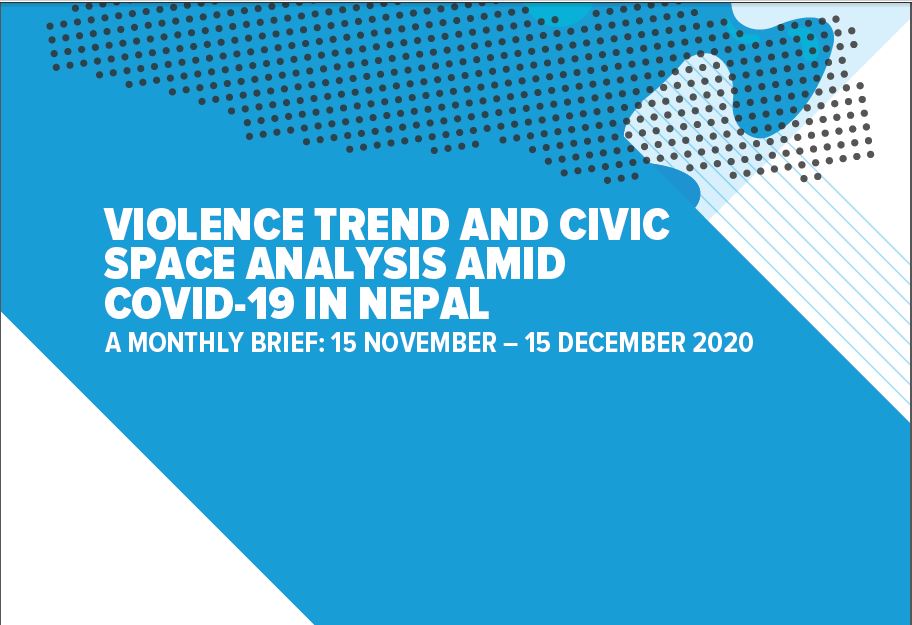Analysis
VIOLENCE TREND AND CIVIC SPACE ANALYSIS AMID COVID-19 IN NEPAL, 15 NOVEMBER–15 DECEMBER 2020
2020-12-31

This report from Violence Monitoring and Shrinking Civic Space in Nepal amid Covid-19 (VMSCS) Project evaluates the trends of violent and non-violent contestation with the objective of presenting their impact on civic space in Nepal from 15 November 2020 to 15 December 2020. Data of violent and non-violent incidents are compiled from reports mapped by NepalMonitor.org, which uses a broad range of information from all major online news portals, national and local newspapers, Nepal Police, Civil Society Organizations (CSOs) working for human rights, and incident reports directly submitted to the Collective Campaign for Peace (COCAP). Multiple incidents of human rights violations, humiliation, physical assault, and use of force against citizens by security personnel tasked with enforcing the lockdown have been reported this month.
OVERVIEW OF INCIDENTS
From 15 November to 15 December 2020, a total of 248 incidents were recorded out of which 105 incidents were violent and 143 incidents were non-violent. The violent incidents injured 22 and took the lives of 12 people. Also, 57 incidents of rape were reported this month.
The violent incidents mainly involved group clashes, violent demonstrations, vadalism, assault, sexual assault, and murder.
The non-violent incidents included protests, demonstrations, sit-ins, arrests, and roadblocks.
The Covid-19 pandemic affected the livelihood of the citizens in Nepal which gave way to incidents such as sit-ins demanding the opening of the Nepal-India border, protests, and demonstrations of frontliners and service holders demanding their pay, and agitation for PCR tests of the staff.
CIVIC SPACE SITUATION AMID COVID-19
Although the constitution of Nepal 2015 has guaranteed the freedom of expression and association, as well as the right to peacefully assemble, there have been sustained efforts to curtail civic space in the country. There has been widespread opposition to the various attempts to pass laws that could systematically curtail civil liberties in the country. Thus, following the pandemic civil society in Nepal has faced serious restrictions on its freedom to express and engage in activism to defend human rights. During the pandemic, the government of Nepal has also demonstrated this type of control over civic space, from inconsistency in their approach toward CSOs to tabeling of various legislative measures and the suppression of peaceful protestors in an attempt to silence all forms of criticism.
COVID-19 PANDEMIC AFFECTING CIVILIANS’ FREEDOM OF MOVEMENT:
This month witnessed a series of non-violent incidents of indefinite sit-ins demanding opening of Nepal-India border, which has remained closed for 8 months for taking the control measures against the spread of the coronavirus crisis. This type of prolonged lockdown enforcement has restricted the mobility of the civilians who are confined to one end of the border and not permitted to travel across the border for work, living, or business purposes. As freedom of movement is curtailed, the civilians have no choice but to respect the freedom not to move in order to avoid spreading of the contagious virus.
Similarly, one incident related to COVID-19 pandemic was linked to the improper healthcare management of the employees by the Tanahu Hydropower Project. The workers accused the company for hiring an employee, who tested positive for Covid-19 without following the COVID-19 protocol and not making any arrangements for keeping employees under isolation. Hence, the workers agitated demanding PCR tests of all the staff having exposure with the infected colleague.
USE OF FORCE FROM THE SECURITY PERSONNEL:
In one of the law and order related incidents reported this month, the security forces used excessive force against the locals picketing the police office and blocking the East-West Highway at Dumkiwas on 11 December 2020, following the death of a 24-year-old tractor driver, accusing that he died due to police brutality. Police personnel fired 13 shells of tear gases saying they needed to take the situation under control.
According to Chief Police Inspector Vikas Bam of Area Police Office Dumkibas, the driver who had gone to the river to extract minerals at midnight ran into an accident while trying to escape from the police team. The driver died the same night while undergoing treatment in Bharatpur. The situation remained tense throughout the night due to clashes between locals and police.
Another incident triggered by governance issues related to legal action and access to justice, was interpersonal in nature that resulted in a two-sided violent group clash injuring 6 persons from the victims and security personnel side. The security forces also used batons and tear gas to control the crowd. The incident was about victim’s family accusing police of weakening the murder case.
To read the complete report, please download the attached PDF.

